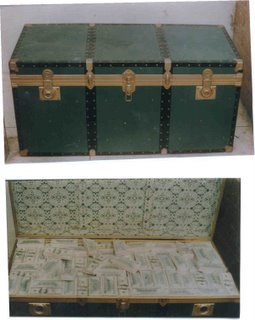[[Update May 21, 2006 ... Check out my new blog address at
WordPress (http://elronsviewfromtheedge.wordpress.com/)]]
Last week, on one of his 'Closer' segments for
the Hour (I think it was Thursday), George Stroumboulopoulos talked about the new ID cards being implemented for cross-border travel between Canada and the US. He mentioned how its important to control borders and have tight, strong security, and essentially, he seemed to throw his support behind the new ID Cards, and rigorous border controls that tightly monitor who comes in and out.
I think having a passport, or some form of travel document is a necessary evil in the modern world. Its important to know who we are when we travel. But as he was talking about controls at the US border, it struck me that one of the things that was so liberating about my trip to Europe last summer was being able to travel around essentially without restriction.
Canada and the US supposedly have an 'undefended' border, and for many years, we've touted the friendly 'drivers license' relationship we have with each other's citizens. None of that prepared me for the ease and fluidity of moving between countries in Europe. I didn't think about Visas or destinations a single time, and had I chosen to stay in Western Europe, I might not have even known I was changing countries. When I drove from Frankfurt to London and back in 1997, the only border controls I encountered were at the Chunnel on the way to London, and at Dover Ferry on the way back to Frankfurt.
Because I chose to go to the Czech Republic, and then on to Poland, my overnight train rides were interrupted by border guards. But I barely remember the experiences, doing nothing more than show my passport to a guard through a train car door. I went from Munich to Prague, then Prague to Warsaw, and back to Munich again, easier than many Canadians can travel to the US. It was certainly easier than traveling to Mexico or other countries in the Americas.
There were many things about the logistics of that trip to comment on ... the incredible passenger rail service in Europe is certainly one ... but ease of travel between countries is certainly worth writing home about, on a trip to Europe. I think we in North America need to learn something from the European Union, and its satellite countries.
We talk a lot about free trade in North America, the free movement of goods and production in the Americas, and that's ONE of the things the EU is about. But North Americans only take it half way. Like I said in my
recent bit quoting David Frum and the Wall Street Journal, with free trade comes free labour as well ... the EU recognizes that, but we seem to want to stick our heads in the sand.
There are many reasons to embrace more free movement of people around the world, and especially within contiguous geographic regions. Economics and tourism are only two reasons, and more become apparent as the policy is implemented on the ground. I do know that one of the joys of my trip through Eastern Europe last year was simply how easy it was to get from one place to the next. We could learn from that, IMO.







